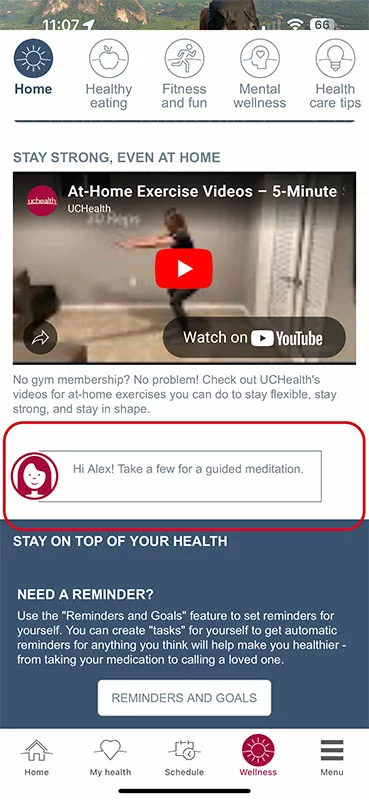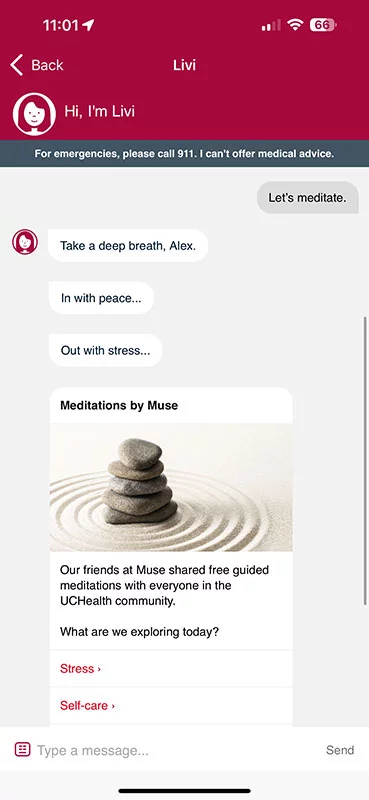
It may look like a bunch of meditation sessions built into a health care app, and it is. But UCHealth’s high-profile placement of guided meditation in its flagship mobile app is much more. It’s a clear statement of how important a major health care institution considers the mind-body connection to be in its patients’ overall health and well-being.
The initial fruits of UCHealth’s collaboration with Muse went live back in 2023. Livi, the app’s virtual assistant, is the vehicle. (The mediation feature is also available through a web browser in My Health Connection – just click on Livi in the lower right-hand corner and type in “Let’s meditate” where it says “Type a message…”).
Livi offers up Meditations by Muse and presents categories for meditative exploration:
- Stress
- Self-care
- Active life
- Healthy aging
- Sleep
- Kids
Each audio meditation is between five and 15 minutes in length. The categories were not chosen randomly but rather are based on the ages and types of patients who tend to engage on the UCHealth app and website, said Nicole Caputo, UCHealth’s vice president of Experience and Innovation.
“We started with categories that would benefit the most people,” Caputo said. “Topics like sleep, healthy aging and stress are areas where many of us could use support in living healthier lives. Since launching the meditations, we’ve added more based on user feedback and need, including options for kids like ‘Drawing with your imagination.’”
Benefits abound with free meditation app
The bigger question, perhaps, is why UCHealth would invest in establishing a partnership to offer meditation. The app designers anticipated this question and have Livi address it through a tappable link that asks, “Why should I meditate?”
“Studies show that meditation can improve sleep, stress and overall wellness. There’s a reason this practice has been around for thousands of years – it can really help you manage day-to-day life!” Livi explains in a text response.
“When life is a little bit out of control, how do we reset ourselves? Meditation is a great way to do that,” Caputo said. “We want our app to be a daily, essential tool for overall health and wellbeing, with free, practical features like meditations to help our community with a holistic approach to health.”
A staggering volume of academic research backs up Livi and Caputo. Patricia Karpas, head of content for Muse and cofounder of the Meditation Studio (a highly regarded meditation app among the numerous others), estimates that there have been more than 10,000 studies on the impact of meditation on health.
“In all different areas, from stress and anxiety to depression, chronic illness, and pain – there’s been research into almost any area that you can imagine,” Karpas said. “Meditation has been proven to help calm the nervous system to help us feel more grounded, more at peace.”

As a sort of cheat sheet, the UCHealth app’s meditations – all of which fall under the category of mindfulness (as opposed to transcendental) – are as follows:
Stress
- Basic breath practice
- Releasing knots
- Let things be
- Soften and relax
- Grounding the senses
Self-care
- Dealing with difficult moments
- Finding strength of mind
- Connect with deep wisdom
- Radical self-care
- Pain as a visitor
Active life
- Sports
- Deep rest for athletes
- Recovery for athletes
- Trust your body intelligence
- Optimal flow states
Healthy aging
- Life transitions
- Big-picture focus
- Mountain strength
- Attitude of acceptance
- Compassion for the body
Sleep
- Soften and sleep
- Infinite stars
- Gently to sleep
- Deep slumber
- Wind down
Kids
- Drawing with your imagination
- Circle of love
- Feel your feelings
- Listening to the rain
- My Heart friend
Using UCHealth’s meditation app

The UCHealth app’s meditations are guided by men and women with voices as soothing as gentle rain. Common among the sessions is establishing a comfortable position – no need to sit in a cross-legged position on a mountaintop, Karpas said. Sometimes simply finding a comfortable posture, taking a pause and focusing on your breathing can be a great way to take care of yourself in the midst of a stressful day. The content itself is diverse. From the “Pain as a visitor” meditation:
Although pain is uncomfortable and difficult to experience, try for the next few moments to regard your pain with ease. Imagine the pain is a visitor to your home, like a wind. Open the front door and the back door of your house. Allow the visitor to come through, and just don’t invite it in for tea. Allow the pain to just flow through, allow the way you’re feeling right now, physically and emotionally. Allow your body and mind to just be ever-changing.
Pregnant pauses space out the sentences. Same as with “Let things be,” which instructs:
Take a moment to notice how your body feels right now. If you’re feeling anxious or stressed, simply observe. How does that anxiety register in your body? You feel the shoulders tight, belly gripping, the jaw tight. Maybe notice tension around the eyes. Start by unwinding the body. Let the shoulders relax down the back of the spine. Lengthen at the belly. Be soft at the jaw. Relax, and the eyes soften. And take three long, slow, deep breaths to begin.
Karpas said she sees meditation and stress-relief-focused practices playing an increasingly important role in traditional health care settings.
“I’m thrilled that UCHealth has taken this important step,” Karpas said. “Meditation, along with attention to the entire mind-connection, is an important piece of any wellness program.”
That certainly applies to the UCHealth app, where appointments, test results, medications, messaging, health care news, and so much more reside. But, meditation and additions such as augmented reality, goals and challenges, recipes and health tips are also important parts of an ongoing story with a simple theme.
“We’re trying to build it as a one-stop daily app to help you get healthier,” Caputo said.
